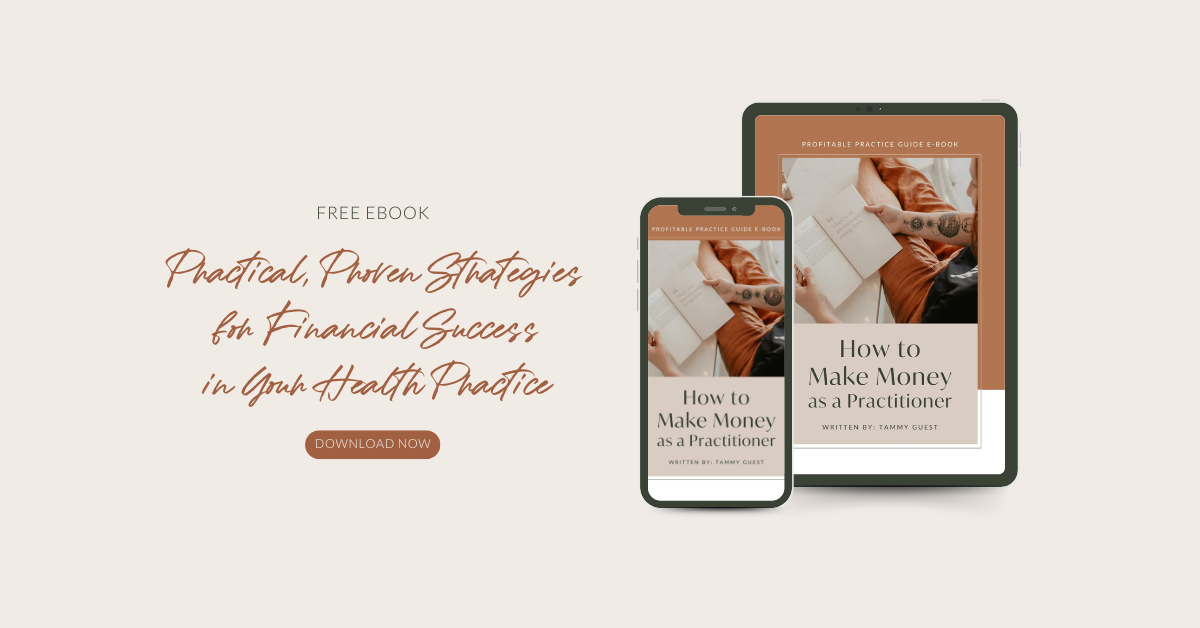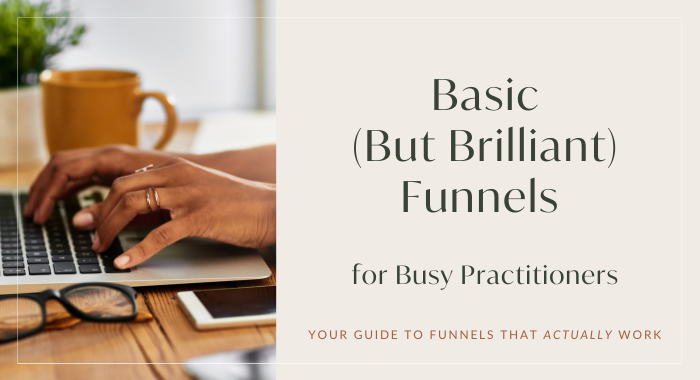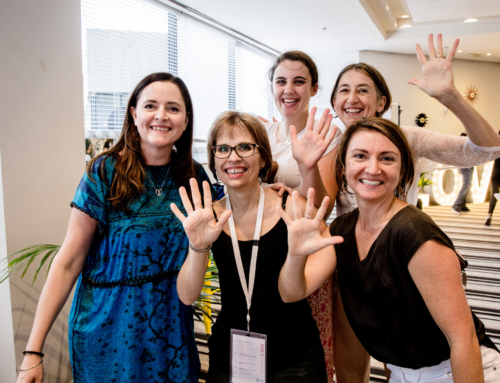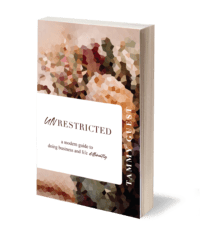What happens when you just ASK?
A conversation with Rebecca Guild of FX Medicine
Rebecca Guild, affectionately known as behind-the-scenes Bec, of FX Medicine Podcast fame, has been a connector in the industry for 15 years. A chance change from studying Japanese and Business took her into the realm of naturopathy. Initially connecting with clients but then going on to connect thousands of practitioners in Queensland as a state rep, all from just asking the company she wanted to work with the most.
After returning from maternity leave, she asked again for what she saw as a possibility to connect with even more practitioners and in conjunction with colleagues Danny and Andrew, FX Medicine began. Her ability to connect and spot innovations have gone on to help create FX Live at conferences, FX Infographics, and FX Medicine Education.
In this candid chat, we also covered the intertwining of personal and business life and the one book that helped keep her relationship connected.
T: Hey everybody, and welcome to another episode of the Natupreneur Movement!
I’m really excited to talk to an amazing human that I get to see on a regular basis at industry events. We also get to hear from her regularly on one of the most famous podcasts for our profession. She is behind the scenes on so many of the different things that we see and hear professionally in our industry. Hi, Bec!
B: Well, hello. It’s always nice to speak to you.
T: So, I know you as “Behind-the-scenes Bec.” ‘Behind the Scenes Bec’ is the behind the scenes part of one of the biggest podcasts we have in our profession, FX Medicine Podcast. FX Medicine is also a major sponsor for the X-Factor Awards. I’m so excited to have them on board!
But you weren’t always ‘Behind the Scenes Bec’ aka X-Factor Awards, aka FX Medicine Podcast. Where did it all begin?
How Did You Get Into Your Current Role?
B: How did I get here? That’s a 15-year saga but I’ll take you right back to the beginning. So I graduated with my advanced diploma in naturopathy and Western herbal medicine in 2003, which I think was when advanced diplomas first became available. Going back a while!
I had this great opportunity with one of the ladies that I studied with at my college to step into a clinical practice straight out of college. It was a really great opportunity. I did all the things but approximately six months into it, I just wasn’t loving it. It wasn’t for me, it wasn’t my thing, it wasn’t lighting my fire.
So I quickly kind of did a reassessment of why I got into that industry, to begin with. Which is a funny story, in itself!
I was due to start my university in a double degree in business and Japanese. You couldn’t get more removed from naturopathy if you tried! But I was always really good at Japanese at school. So, the uni thing, I was going to do Japanese. And because you always need a backup plan, I coupled it with business. I just figured I’d end up in a travel job or a translating or whatever. And so I promised my mom I would start uni but I took a gap year.
Then in the process of looking for a job, I found a role in a diagnostic pharmacy, which was fantastic because it was open till midnight. I needed something I could work at night that wasn’t a bar, and especially here on the Gold Coast. So I took this job as a junior. The reason I was hired over some of the other juniors was that I could speak Japanese, which was a pretty large portion of the customers.
What Do You Want To Do When You Grow Up?
The customers were coming into that store asking all sorts of questions about supplements and this, that, and the other for anti-aging, so I very quickly got super interested in vitamins. I’ve said before, “I think that the thing that got you into the industry is where you need to start with what you want to do when you grow up.”
T: Absolutely. I think it’s gold and we negate it. We go, “that’s not the thing.”
B: Yeah, but it is the thing in! Invariably, it is the thing.
So I went back and I examined that. It was really, basically, vitamins. I could care less about being in clinical practice. It’s not my bag of dice. It doesn’t set my world on fire. So I wanted to learn what I needed to do to be more involved in vitamins.
Ask For The Role You Want
I wrote down some of the brands I had some passion or enthusiasm for based on what I’d worked with in the chemist over that time. But also what I was exposed to in college, and came up with a couple of brands. I ended up with an interview with a couple of them.
But it was Bioceuticals that rang me. Within a couple of hours of receiving my resume, they flew me to Sydney really quickly. It was such a whirlwind! So I went to Sydney and landed a job as what was then called a CRM, a Client Relationship Manager, working in the head office in Sydney, managing all the customers from Victoria with the rep team. Basically, I was their in-house companion or support person for those sales reps that worked in Victoria.
It was a really great first place to understand and see how a big company worked – or what seemed like a big company to me. Looking back now, it was quite small back then!
It was around 2004 when I joined Bioceuticals at the ripe old age of 22. I did that job for a while and I loved it – loved going there, being there, the people – And I still love it. But what I didn’t love was living in Sydney. So as soon as there was an opportunity available to take a role up here in Queensland, I put my hand up and jumped on it. Somebody left the team here in Queensland and I was actually already being prepped to move into a practitioner-consultant role, into a repping role out onto the road, but I was going to do it in New South Wales.
It was Andrew (from FX Medicine Podcast) who really helped to get that over the line and get me back to the Gold Coast. That was about 2005. Then about a year and a half into it, they appointed team leaders because the team soon started to grow. Back then, we only had two or three reps in every state and they wanted to start expanding. So that role became what was called the Team Leader role. I took that on around 2006 and I pretty much had that role until I had my son in 2011.
I went from being a Team Leader to State Manager during that time, but yeah, I did that from about 2006 to 2011.
Be Open To New Opportunities
T: How many people were you helping then?
B: It started with myself and two others when I first took on that team leader role. By the time I went on maternity leave, I think we had a team of seven.
T: And that takes a whole different set of skills to manage a team of seven and then connecting with what I would imagine being thousands of practitioners across the state. Versus that feeling and that vibe that you got from the first six months of being in practice. They’re a different set of skills, right?
B: Yeah, a different set of skills, but something that I thrived with and was passionate about.
Preferring a Team-Based Environment
The difference between being in a clinical practice setting when you’re in your student clinic environment is that it’s very team-based. You know, sometimes you’ll take those cases or those consultations, or at least back in my time, we’d do them into pairs, or twos and threes. So you’d have a companion to discuss that case with and then you’d take it back into the dispensary and discuss it with your teaching staff. So it was a very team-based environment.
To move from that into a more secluded, more isolated clinical practice – I think that’s what I really struggled with. This is what I loved about moving into repping, which progressed further into the State Manager position.
On any given month, I could see up to 150 practitioners and I basically became that source of sounding board, that team position, I suppose, that I really enjoyed being a part of in the clinic. Hashing out ideas, thinking about some different avenues for treatment and what have you, but with no responsibility for the patient whatsoever.
Being that sounding board and being exposed to so many great minds and clinicians really gave me fulfilment to walk into that role and be the person who I desperately would have loved having myself when I was in private practice. Someone just to chat to me about my cases instead of me having to hit the grindstone and figure out all the research and the deciding factors on my own.
Nobody Wants To Be In Sales. . . Right?
I’m really passionate about repping. I remember years ago somebody saying to me that “nobody wants to be in sales.” But the thing is, number one, it pays really well, in my opinion. And number two, if you’re doing it for a product, industry, or something that you’re truly passionate about, it doesn’t feel like work. I just felt like I got paid to socialise, it was fantastic! And the byproduct became the sales.
It really suited my personality and then it just developed into new areas. When you become a state manager and you’re responsible for other staff, it’s their development that gives you success. You can go, “Look how far they’ve gone – from this place to this place.” Or at least that’s my hope. Hello to all the seven of you that I used to look after back in the day. I loved that role. I lived for it. I lived and breathed it and it never felt like work.
Finding a Career In Alignment With You
T: Yeah, and I think that you’ve hit the nail on the head there. Being in alignment with something and being passionate about something. That’s what you did – you found these companies that you felt in alignment with and then went for them. Rather than the other way around of desperately seeking a job that might not be in alignment with you. I think it makes a massive difference.
And from the practitioners that I mentor, and the ones that we hear from on the podcast, a lot of people are struggling with clinic and wonder what else they could do. There are so many roles out there. If you find the one that’s suited to your personality, it creates this really easeful flow in your life. So it doesn’t just become work, it becomes life as well.
B: Yeah. I think that’s when you know that you’ve stepped into your zone of genius is that it starts to become fun and it doesn’t feel like work. There’s nothing worse than dragging your butt out of bed every morning and going, “Oh, god, it’s Monday. I’ve got to go to work.”
“You’ve stepped into your zone of genius when it’s fun and doesn’t feel like work.”
I must admit, there’s probably only been a very small stint over the course of that 15-year career, where that has happened to me. In all situations, it came down to the people that worked above you. They either motivate you or they de-motivate you. I tried as much as possible to focus on the positives.
I can even think back as a teenager, even then when I was working in jobs like a KFC, your manager or the person that you’re supposed to look up to, or that you’re supposed to take direction or the lead from, makes a real difference to how your workday is going to pan out it. It’ll make it positive or it will make it negative.
It comes down to working with people. That was the struggle I had with clinic. I worked in a team of other clinicians, sure, but we all had different things happening. We came together sometimes and we were great friends. It was a great environment. But having to be the sole decision-maker for the patient just wasn’t enjoyable.
T: It wasn’t in alignment with your zone genius, that connection that you have.
Don’t Ignore All Your Other Skills And Connections
B: I think sometimes we all think, we’ve done our qualification and all I am is a naturopath. But you’re actually a naturopath or a herbalist or a nutritionist with all of these other skills and contacts and connections that you’ve developed up into that point. I think that what gets forgotten as you’re finding your identity with this new qualification, is how to leverage all the other skill sets you’ve developed along the way to take you forward into whatever is going to become your next step.
T: One of the things that I love about the podcast I’ve heard you on and I happen to know that you are a little bit of the genius behind the amazing infographics that are part of FX Medicine education side, is that you do love the research. It’s part of those conversations you were talking about, to have those conversations with other practitioners that you would see over the month. You’d still like to research things behind the scenes without necessarily the responsibility factor.
What ended up shifting, that you followed that aspect of it – that education, being of help and assistance in that way – that took you over to the FX side of things?
B: After I came back from my maternity leave, I was in more of a business development role, more corporate account management and partnerships. But a lot of that wasn’t necessarily making great use of my naturopathic and nutrition skills.
Be Open About What You Don’t Love
So I was starting to lose a bit of my sparkle for that. It was just through a conversation that I had with Danny, who’s my boss now, where I was like, “Hey, these are the things I’m liking. But these are the things I’m not liking.”
One of the things I was very interested in and constantly involved in was discussing what was happening. What are the things people are interested in learning about? What are the things that people are talking about? Why aren’t we following this? Or, why can’t we have this ingredient? Getting a sense of how people were having discussions online, and to show the power of the voice that we have as an industry on social media.
Connecting With Practitioners On A Larger Scale
I guess from that, Danny realised that I had a real passion for connecting with practitioners through social media. So it was no different from being a rep, it was just on a much larger scale. Through that, I got this idea. We already had the podcast back then. He was a very early adopter of podcasting. I must admit, I didn’t know what a podcast was when we first jumped into that space. So that started in 2014.
The role for me to move into – what is now the FX Medicine role I hold – was developed in 2015 when it was decided that we wanted to bring that into a much bigger digital space. It needed to have a social media presence to drive the growth of the podcast. Another part of that was to develop the website so that we could have the podcast and create show notes. We could have transcripts as we do now.
Obviously, we’ve built that into articles research. From there, I attended a conference and I saw they had a stage set up. It was like a pharmaceutical conference. It was a stage for like media and interviews and things like that. I went back to Denny told him what I saw. I really thought that was something we could do at some of the major conferences – be this media place. Because we were already kind of doing some filming and various things anyway, so it was just building on what we’d already created. So then FX Live was born.
Then over time, we’ve just we’ve developed such great relationships with practitioners and researchers in so many different areas, fields, national, and international that the sky’s the limit for the places that we take FX Medicine. It’s become like my second child.
Contributing To The Conversation
T: I love that. And I love that you’ve continued with the essence of you connecting with other practitioners. You’ve just changed the format in which you do it.
You’ve continued with just asking for what you actually want. Asking the company that you wanted to work for, and then just asking to create a certain platform.
We love FX Live! Oh my goodness, I love that stage. I love seeing all the Facebook Lives now that we get to see, even when we’re not at one of these conferences. Getting to see who’s been on stage and what the most awesome takeaways are. It is such a big contribution to the conversation.
B: The contribution to the conversation I think is the driver. You know, there are so many negative pieces of media out there when it comes to care. I guess we just want to be part of the process of bringing forth all of the positive parts of care that aren’t squashed by the regulatory side of things that tend to occur.
I was listening to your interview with Becky, whom I’ve met a bunch of times at different events over the years. She gets to be the ultimate Negative Nancy by squashing all of the things that happened Regulatory Affairs because it’s basically risk management. “No, you can’t say this. Yes, you can say that.”
Particularly when you have a commercial brand and a company or product brand there are laws that you have to abide by when it comes to advertising and promotion, in particular. What ends up happening is that there is all this phenomenal research and learning that we all miss out on because companies are teaching you how to use their products with one hand tied behind their back because they say certain things.
Let’s use cancer as an example. There’s so much evidence when it comes to oncology for things like turmeric. Or there is positive and negative research out there when it comes to glutamine and vitamin D. But you can’t necessarily connect that to a product because that’s a very risky regulatory area to stick into.
Whereas if you’re just disseminating the education, that’s a different story. So, FX Medicine has always been this platform where – particularly Andrew, lives and breathes everything oncology. I don’t know if anyone notices when he does an interview, but, that’s his zone of genius. That’s a real area of strength for him. He’s an epic research nerd at the best of times – don’t get me wrong. But you can really see him step into the light when it comes to oncology.
Some of those conversations are very highbrow when it comes to the biochemistry, the research, and all the things. Whereas in other discussions, he might be led by the person speaking because he may not necessarily know as much about the topic.
T: I love that you guys are contributing to the conversation and you’re finding the other people who contribute to the conversation.
Creating The FX Medicine Community
B: Well, we always had a vision for the brand from the very beginning. I’ve got to give credit to Melissa Lee, who is my colleague, who was right there at the at that same starting point as myself. FX medicine would 100% not be the brand that it is today without her, her insights, and her vision. She’s a nutritionist but also a graphic designer.
When we were trying to figure out even some simple things about the brand, such as:
- the look and the feel of it
- from colour to design
- the tone of voice that we take when we speak on social media or when we speak in FX Live interviews
All of these things are formed part of the brand. But it’s also been a really important part of the vision to build a community around care. To create a community, an engaged community that chat to us, that give us ideas. When somebody sends us a direct message, or they comment on our posts, or they engage with us in some way that started a conversation with us, we take that very seriously. It goes into a place where we figure out how we can bring interviews or resources to life to answer the need that they’ve asked for. We don’t just go, “Oh, yeah, thanks, Joe Bloggs, that was really great.” And then just continue doing what we’re doing.
We’re always thinking about the community. We’re always taking on board what they say, what they think, and what they want. Obviously, we get statistics, insights, and metrics from the podcast, from the way people use our website, for the websites that are most popular. And we use that information to determine the things that people are craving information on. What do people spend the most time listening to? What’s the path by which they come to us? Is it from Facebook? Is it from here or from there? Where is our community? Who is our community?
Because at the end of the day again, it’s connecting. It’s creating that conversation but hopefully motivating and educating and being a place where people can come and get what they actually want. That’s the hope.
People can tell us if that’s not what we’re delivering on. But from all the feedback that we receive, it’s been overwhelmingly positive (but not always).
T: Well, we all live in an online world and it can never be always positive.
B: That’s right. And there’s an awful lot of people out there who have an enormous amount of time on their hands and just seek to be haters. Haters gonna hate.
T: I want to acknowledge the contribution that FX is. It’s now actually my second Google if I want to find something.
You’ve got a beautiful search button on your page so it’s a really easy, quick way of finding one of the answers. You’ve got transcripts there so I don’t even have to listen to the whole bloody interview to find the question that I want. And the infographics were a game-changer in my clinic. I’m so excited that they’re they’ve come back in this full-fledged, high def, awesomeness.
To be able to explain to our clients, it’s the easiest way to understand things that are happening for them. Instagram is my favourite way to follow you guys, at the moment, because there’s so much interaction over there. You get to see where you guys are interacting and what’s been happening. And you do answer the questions in the DMs because I’ve been in there telling you I really want to hear more about this kind of stuff. So much cool stuff! You are in that forefront because you are answering what clinicians actually want.
So it’s really cool. I love your work.
B: Oh, thank you. We love your work too. That’s why we’re doing the X-Factor awards. We wouldn’t do it if we didn’t love you!
T: I’m super pumped about the X-Factor words. But one more question before we finish up.
How Do You Handle – Or Prevent – Burnout?
The theme of NatEx is, ‘Love Your Work, Love Your Life, and Love Yourself.’ In every interview that I’ve done, we’ve talked about the love yourself component. It can sound a bit off, to love yourself. But with such a huge burnout rate in our profession, I just want some tips and tricks that are doable for our praccies out there, that will keep our practitioners in alignment with actually loving their life and being who they’re here to be.
Has anything helped you along the way either in your career or that you’ve researched that would help a practitioner who either senses burnout or to avoid burnout?
B: That’s such a loaded question. We all need to learn or find ways to build our own personal growth. One experience with a personal development course many, many years ago was a phenomenal thing for me to do. I would have been 23 or 24, but it just completely reshaped my outlook on everything – personal and work – and how I approached things.
Another thing that’s completely shaped how I do things is the book, The Five Love Languages. My husband asked me this morning, “Can you give me a shout out on your podcast?” And I said, “Yeah, sure.” And I was just thinking myself, how am I going to do that? But actually the love languages – I’ll give you a shout out there because it is part of why I think we’re still together nearly 20 years later.
“I think the burnout side is in my opinion, it’s easy to burn out when your personal life and your work life are at odds with each other.”
T: Oh my goodness, that is gold. Take that in, people who are listening! I see it time and time again with the practitioners that I help in a one on one type of setting. We try to compartmentalise our lives but they are so intertwined. If one’s off, the way we do one thing is the way we do everything. So look after that side of it and have those insights.
The Five Love Languages changed my relationship with Murray – we now run NatEx together and retreats and stuff – but it was from understanding one another in the home.
Communication Is Key
B: Well, it removes unnecessary conflict because all of a sudden, instead of you thinking, “Oh, that that thing that he said really hurt me or crushed me or it was horrible or whatever.” You can take a step back and go, “Hang on a minute, where’s it coming from?” To seek first to understand and then be understood, to take a moment and take a breath and don’t be reactive. Rather, be more proactive. Definitely to understand first. If your personal life and your work life are at odds if you’re spending too much time at work and not enough time on your relationships or with your children or anything like that, especially as women (which make up about 80% or more of our profession), then it’s very quick to drain your cup.
If your cup is constantly drained and you’re running on the hamster wheel, not helping your personal relationships, not focusing on your own mental health, not talking to yourself with positive self-talk – if we’re not doing those things, then what’s the point in attending the thousand dollar personal development workshops? Start with the basics. Make sure that you’re being supported in your relationship, that you’ve done all that you can to improve the communications because that’s key. That’s key with everything. You can’t be a great practitioner without really great communication skills.
If you’ve got all those things in alignment, I think burnout becomes less. Or conversely, when you are getting to that point, hopefully you’ve got a husband, children, friends, or parents who recognise it in you straight away and go, “Hey, hang on a minute, are you okay?”
To me, if you’ve got those things, that support network, you’ve succeeded. You’re a success. You’re a successful human.
It Always Comes Back to Connecting
T: Back to the connections I love that! That is clearly a common thread throughout your entire life, work, self – those connections to others. And I couldn’t agree more. Having connections in my professional life, my family life, and even random people. I love connecting and knowing that we’re all there for one another. I think it’s one of the most awesome things about being human.
B: Yes. And you’ve created it as well, that being there for each other. With the Natupreneur Movement and NatEx. It’s basically like you’ve created the cam cheese squad, Tammy! I think it’s great because for many years we were all told, “You’re not getting into this industry to make money. You only do it for the passion.” Or whatever other silly things people have said to us over the years about how you’ll never have a career in natural medicine.
Well, I’d like to say that they’re all wrong. I’ve had a very fulfilling career so far and hopefully, it’s not ending anytime soon.
T: Thank you so much for a wonderful conversation, Bec. I have loved this. It’s been awesome to chat! I can’t wait to see you at the X-Factor Awards!
Did You Find A Golden Nugget?
For those of you who are listening with an ear out for your golden nugget, which one was it?
- connecting with others
- asking for what you want
- connecting your past with your current life
- being able to say no to clinic if it’s not for you and yes to something else because it is
- pivoting along the way and changing the way you’re doing things so that you get even more on alignment
- or being connected with your partner so that all of your life is in alignment.
If this conversation struck a chord with you, if you found a gold nugget of wisdom – please share it with someone else who might benefit!
Join Us For The X-Factor Awards
Are you coming to NatEx? It’s coming up in February and you won’t want to miss it. There will be so many amazing speakers, workshops, connections, and golden nuggets there. And, of course, the X-Factor Awards, which will be so much fun!
Don’t let this event pass you by.










Leave A Comment